Classification of ligands - Study guides, Class notes & Summaries
Looking for the best study guides, study notes and summaries about Classification of ligands? On this page you'll find 15 study documents about Classification of ligands.
All 15 results
Sort by
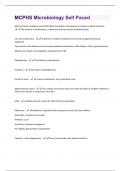
-
MCPHS Microbiology Self Paced Questions and Answers Latest 2024/2025 with complete solutions
- Exam (elaborations) • 26 pages • 2024
- Available in package deal
-
- $7.99
- + learn more
Which of these conditions would NOT affect the ability of Streptococcus mutans to attach to teeth? - The absence of Actinomyces, a bacterium that can be part of dental plaque cell wall components - M proteins: mediates attachment and resists phagocytosis (strep. pyogenes) Opa protein: assist attachment and recept mediated endocytosis, inhibs helper t cells (n. gonorrhoeae) Mycolic acid: Waxy, resists digestion (mycobacterium TB) Pathogenicity - The ability to cause disease Virulence - the...
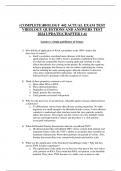
-
(COMPLETE)BIOLOGY 442 ACTUAL EXAM TEST VIROLOGY QUESTIONS AND ANSWERS TEST 2024 UPDATE(CHAPTER 1-6)
- Exam (elaborations) • 8 pages • 2024
-
- $11.99
- + learn more
COMPLETE)BIOLOGY 442 ACTUAL EXAM TEST VIROLOGY QUESTIONS AND ANSWERS TEST 2024 UPDATE(CHAPTER 1-6) Lecture 1: Origin and History of Viruses 1) How did the of application of Koch’s postulates in the 1880’s lead to the discovery of viruses? a. Koch’s postulates correlated many diseases with their causing agent/organism. In the 1880’s, Koch’s postulates established four criteria to isolate the responsible disease-causing agent and correlate it to the effects that disease was ca...
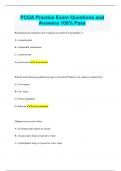
-
PCOA Practice Exam Questions and Answers 100% Pass
- Exam (elaborations) • 16 pages • 2023
- Available in package deal
-
- $9.99
- + learn more
PCOA Practice Exam Questions and Answers 100% Pass Regarding point mutations, the exchange of a purine for pyrimidine is: A: a translocation B: a frameshift substitution C: a transversion D: an inversion a transversion Which of the following publication types is the LEAST likely to be subject to author bias? A: Case reports B: Case series C: Practice guideline D: Editorial Practice guideline Deliquescence occurs when: A: two hygroscopic drugs are mixed B: a hygroscopic drug is exposed...
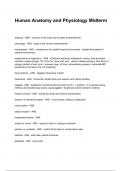
-
Human Anatomy and Physiology Midterm
- Exam (elaborations) • 13 pages • 2024
-
- $7.99
- + learn more
Human Anatomy and Physiology Midterm anatomy - ANS structure of the body and it's parts (nomenclature) physiology - ANS study of the function (experiments) homeostasis - ANS maintenance of a stable internal environment - despite fluctuations in external environment requirements of organisms: - ANS H2O(most abundant substance in body), food (provides nutrients, supply energy), O2 (1/5 of air, drive met. proc., used to release energy), heat (form of energy, product of ...
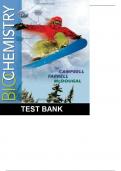
-
Biochemistry 9th Edition Campbell - Test Bank
- Exam (elaborations) • 655 pages • 2023
-
- $24.09
- + learn more
1. How do the molecules that play a role in living cells compare to those encountered in organic chemistry? a. They are the same, just operating in a different context. b. Biological molecules are organic molecules, but the similarity ends there. c. Biological molecules aren't similar to organic molecules at all. d. Biology isn't based on molecules at all, but a "vital force". ANSWER: a POINTS: 1 QUESTION TYPE: Multiple Choice HAS VARIABLES: False LEARNING OBJECT...
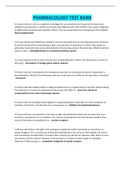
-
PHARMACOLOGY TEST BANK
- Exam (elaborations) • 20 pages • 2023
-
Available in package deal
-
- $7.99
- + learn more
PHARMACOLOGY TEST BANK A 10-year old boy is sent to a pediatric neurologist for an evaluation due to poor performance and inability to pay attention in school. He has also been fighting with other children. He is given a diagnosis of ADHD with impulsivity and irratibility. Which is the most appropriate for management of the ADHD? - dextroamphetamine A 10-year-old boy with ADHD has symptoms that are controlled with an oral psychostimulant. However, he and his family wish to avoid having to give...

-
Pharmacology PreTest Self-Assessment and Review Twelfth Edition
- Exam (elaborations) • 489 pages • 2023
-
- $14.79
- + learn more
Pharmacology PreTestTM Self-Assessment and Review Notice Medicine is an ever-changing science. As new research and clinical experience broaden our knowledge, changes in treatment and drug therapy are required. The authors and the publisher of this work have checked with sources believed to be reliable in their efforts to provide information that is complete and generally in accord with the standards accepted at the time of publication. However, in view of the po...
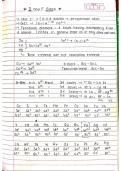
-
CBSE CLASS 12 CHEMISTRY CHAPTER 5 COORDINATION COMPOUNDS HANDWRITTEN CLASS NOTES
- Class notes • 14 pages • 2024
-
- $5.39
- + learn more
Chapter 5 of Class 12 Chemistry explores coordination compounds, which consist of a central metal atom or ion bonded to surrounding ligands through coordinate covalent bonds. The chapter covers key concepts such as coordination number, oxidation states, and the geometries of these compounds. It delves into naming conventions, isomerism, and the role of ligands, including their classification as monodentate, bidentate, or polydentate. Additionally, the chapter examines the applications of coordin...
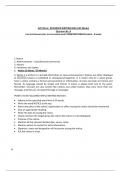
-
ORGANOMETTALIC CHEMISTRY
- Summary • 36 pages • 2024
-
- $9.59
- + learn more
1. Metal-Carbon Bonds: - Organometallic compounds feature direct metal-carbon bonds. - Common ligands include alkyls, aryls, and carbonyls. 2. Classification: - Organometallic compounds are classified based on the type of metal-carbon bond, such as sigma bonds (σ) or pi bonds (π). 3. Reactivity: - Organometallic compounds often exhibit unique reactivity compared to organic compounds. - They can undergo nucleophilic and electrophilic reactions. 4. Applications: ...
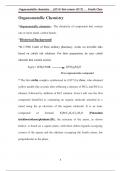
-
ORGANOMETTALICS CHEMISTRY
- Summary • 82 pages • 2024
-
- $7.99
- + learn more
Organometallic chemistry is a branch of chemistry that studies compounds containing metal-carbon bonds. These compounds often involve metals from groups 1 to 12 on the periodic table. Here's a brief overview of key aspects of organometallic chemistry: 1. Metal-Carbon Bonds: - Organometallic compounds feature direct metal-carbon bonds. - Common ligands include alkyls, aryls, and carbonyls. 2. Classification: - Organometallic compounds are classified based on the type of metal-c...

How did he do that? By selling his study resources on Stuvia. Try it yourself! Discover all about earning on Stuvia


